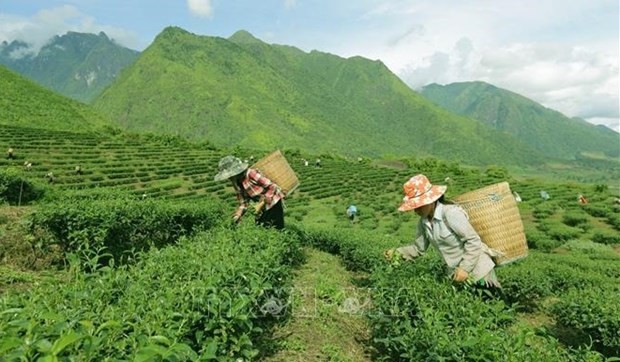
Workshop stresses livelihood development in poverty reduction efforts
Latest
 |
| People harvest tea buds in a mountainous area. (Photo: VNA) |
To Duc, Chief of the National Office on Poverty Reduction under the Ministry of Labour, Invalids and Social Affairs (MoLISA), highlighted some changes in the programme which looks to provide multidimensional assistance for the poor, especially in improving income and boosting their access to basic needs.
The goal is to achieve multidimensional, inclusive, and sustainable poverty reduction; minimise poverty relapse and new poor households; help the poor get above the minimum living standard, access basic social services, and improve quality of life; and support poor districts, particularly disadvantaged communes, coastal and insular areas, to escape from poverty.
Stressing the project on developing vocational education and sustainable livelihoods, part of the national poverty reduction programme, Duc noted MoLISA found that with vocational training, a labourer can access the labour market and earn his income, which is an effective measure for poverty alleviation.
A representative from the Gender Responsive Equitable Agriculture and Tourism programme (GREAT) of the Australian Department of Foreign Affairs and Trade (DFAT) said with open approaches and the spirit of creating conditions for localities and communities to creatively apply livelihood models, and encouraging enterprises and non-poor households to join in business connections with the poor in remote regions, the national target programme will create a foundation necessary for deprived areas to enhance their production, infrastructure, and technological capacity.
This representative said the GREAT project has attracted over 27,000 women in the northern mountainous provinces of Son La and Lao Cai to activities in 10 agricultural and tourism areas. About 70 percent of them are from 20 ethnic minority groups, and the majority live in areas with high poverty rates. The project has helped over 15,000 women improve their income.
At the workshop, participants discussed issues related to building guidance for diversifying livelihoods, developing poverty reduction models, providing vocational training, and assisting people to work abroad under contracts. They also shared the success stories of some livelihood development and income generation models.

















